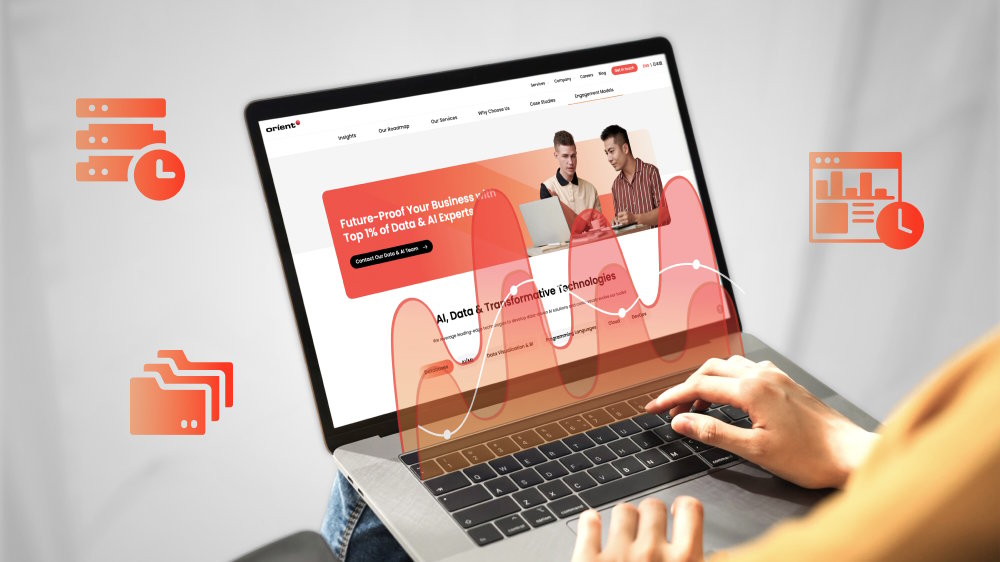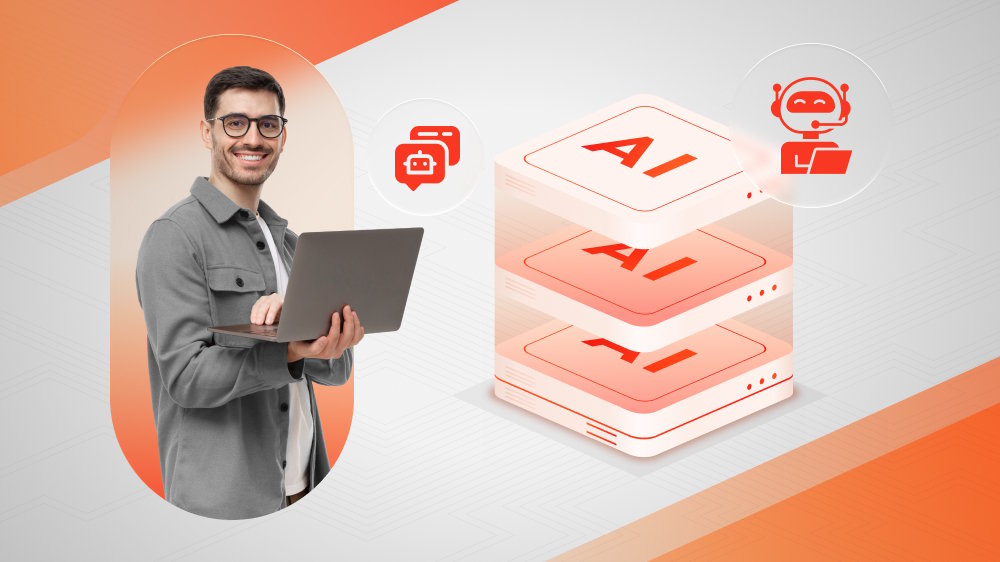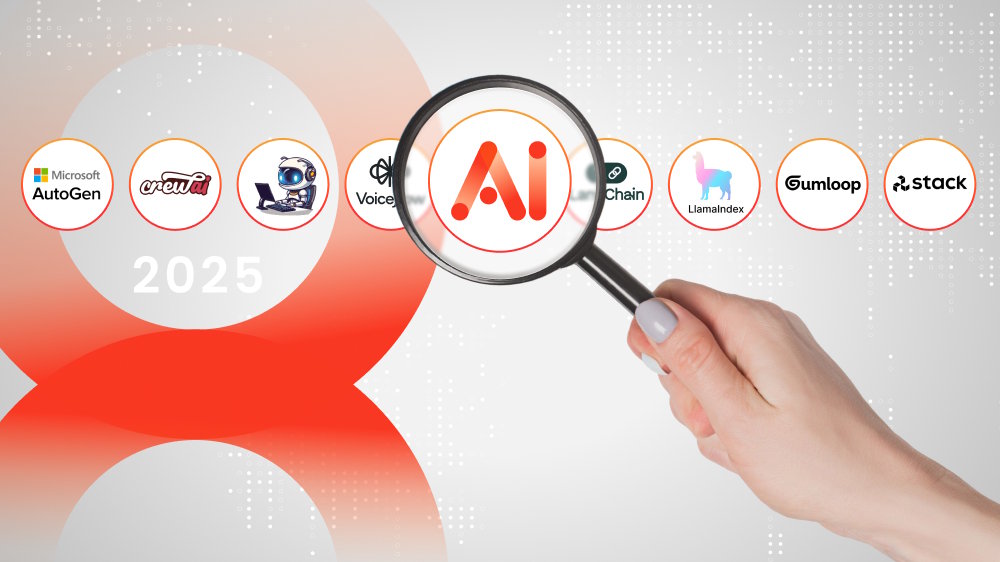
The Ultimate Guide to Deep Learning as a Service (DLaaS)
Deep learning as a service (DLaaS) makes it easier than ever for businesses to incorporate AI into their workflows. Read on to discover what DLaaS is, how it works, and the different real-world applications you can use it for.

Content Map
More chaptersMany businesses are incorporating artificial intelligence (AI) into their workflows these days. But few have the ability to deploy an on-site solution that is affordable and viable. Local AI systems are expensive and time-consuming to set up, requiring extensive planning and deep technical expertise to get them running.

That’s where Deep Learning as a Service (DLaaS) can help. DLaaS helps overcome the limitations of local AI systems by saving companies time, money, and hassle in establishing an on-site solution. As a cloud-based solution, it offers a faster, more affordable, and more scalable alternative than a local system.
Read on to find out what DLaaS is, how it works, the different use cases of DLaaS, and what to look for in a DLaaS service provider.
What Is Deep Learning as a Service (DlaaS)?
DLaaS is a type of cloud computing service that enables businesses and individuals to access a wide range of deep learning capabilities. DLaaS encompasses various technologies, including natural language processing (NLP), computer vision, and automatic speech recognition. These technologies enable the AI system to process large amounts of data, recognize patterns, and predict potential future outcomes.

To access DLaaS services, users need only a secure internet connection and to pay an ongoing monthly or annual subscription fee. DLaaS providers typically charge for their services on a pay-as-you-go basis. That means you pay only for the services you use. This makes it easy for you to anticipate your ongoing AI expenditure over the long term.
How prominent is the use of DLaaS on a global scale? The AI enterprise applications market, which includes DLaaS, has an estimated market size of 31bn USD. Much in the same way that companies have switched to Software as a Service (SaaS) platforms over the years, those same companies are always resorting to DLaaS providers to fulfil their AI integration needs.
How Does DLaaS Work?
DLaaS operates on the ‘as a service’ platform. That means all the deep learning tools and software are hosted in the cloud on remote data centers. The DLaaS providers are responsible for the setup, deployment, and ongoing maintenance of the deep learning services they offer.
DLaaS deploys a wide range of technologies to be functional. These include deep learning algorithms running on artificial neural networks, consisting of interconnected nodes whose structure replicates the human brain. These nodes collaborate to process large amounts of input data, flowing through multiple layers to perform nonlinear transformations. The final output generates an accurate prediction.

DLaaS allows individuals and businesses to quickly and easily access a wide range of deep learning capabilities without the hefty upfront cost and time investment. They allow users to create custom machine learning models to help power all kinds of functions, from customer service to product research and development, financial services to human relations, and more.
DLaaS is also easy to scale, as there’s no upfront hardware investment to add or decommission deep learning capabilities. Users simply adjust their subscription fee accordingly, tailoring their usage to what they’re willing to pay for.
What Are the Real-World Applications of DLaaS?
There are many examples of companies using DLaaS to bolster their AI-driven capabilities. These include companies operating in heavily-regulated industries like healthcare, banking and finance, and more consumer-friendly industries like entertainment.
Let’s take a closer look at exactly how these industries are enhancing their capabilities with DLaaS.
Healthcare
Deep learning is changing the healthcare industry in many ways. Healthcare providers are required to process large amounts of data, including personal patient data, medical records, scans and images, and more. However, traditional data collection methods struggle to process and gather valuable insights from such data, which exists in an unstructured format.

DLaaS gives healthcare providers a fast, easy, and effective way to gain deep insight from their data. By harnessing complex algorithms and vast datasets, healthcare providers can identify patterns to make more informed decisions. They have the potential to more accurately diagnose diseases, anticipate future health concerns sooner, and streamline the patient onboarding and monitoring experience.
In the UK, the National Health Service (NHS) partnered with IBM, using IBM watsonx.ai to improve patient delivery services. To be exact, the goal was to address last-minute cancellations, which contributed to significant patient dropoffs. By sending automated appointment reminders sooner and on a more frequent basis, the NHS was able to see 700 more patients weekly without any added staff, as well as reduce appointment non-attendance by 6 percent.
Entertainment
Streaming services like Netflix are constantly striving to improve the viewing experience. One way that these companies are driving further view engagement is with personalized recommendations.

By utilizing powerful DLaaS services, streaming services can recommend new shows for viewers to watch based on their account activity, including time spent watching certain shows, search history, favorited shows, ratings, and time spent browsing certain categories. The idea behind this is to reduce the amount of time that viewers spend looking for the next show to watch, in turn resulting in more viewing time and less time browsing.
Netflix’s deep learning recommendation system also learns from new interactions, such as when a viewer skips or fast-forwards a show, further refining its prediction modeling to give more relevant show recommendations.
Banking and Finance
Deep learning is playing an increasingly vital role in the banking, finance, and fintech sectors. With the ability to analyze large, vast datasets, financial service providers can more effectively minimize risk, conduct fraud detection, and capitalize on potential gains. And they can do so with greater precision than traditional data collection methods.

One such example where DLaaS is excelling is in stock market prediction. DLaaS services can analyze large amounts of historical data, including financial transactions, previous stock market movements, and other economic indicators. They can then identify patterns and predict potential future stock market events. Investors can then make timely, data-driven decisions that enable them to avoid risk and make optimal trading decisions.
Orient Software has provided powerful machine learning solutions for the financial technology sector. We’ve helped fintech providers enhance their core capabilities to better meet customer demand. We’ve also helped documentation solutions providers like Excosoft scale up to more advanced CCMS platforms, complemented by AI support features to streamline workflows and boost efficiency.
Advertising and Sales
In the world of advertising and marketing, companies are constantly striving to deliver more personalized advertising campaigns. They want to go beyond just advertising what they think the customer wants. They want to deliver the right recommendations at the right time, every time. And with the advent of DLaaS solutions, artificial intelligence in sales and advertising is no longer a pipe dream.

DLaaS offers a variety of solutions tailored to advertising and marketing departments. By deploying complex algorithms and analyzing vast datasets, marketers can create unique customer profiles. They can analyze your previous purchases, browsing history, favorited items, shopping basket items, and time spent browsing certain product categories.
In doing so, marketers can tailor their marketing strategies to conform to the needs and wants of individual customers. This is more effective than targeting a blanket target audience, as people’s nuanced tastes and preferences can be taken into consideration. Companies can also perform sales forecasting, anticipating potential sales for a particular season or product line based on past sales events. Thus, they can anticipate stock demand without over- or under-ordering.
Virtual Assistants
Virtual assistants operate round-the-clock to support customers when human representatives are unavailable. Powered by NLP and complex algorithms, DLaaS-powered virtual assistants can understand and respond accordingly to speech and written text commands. They can answer questions, provide general guidance and support, and redirect customers to a human representative when needed.

Virtual assisted technology is in huge demand. The speech-based NLP market size reached 21bn US dollars in 2024, with an estimated 149.8 million voice assistant users. While these findings do encompass consumer products like smart speakers, they also cover custom business solutions like chatbots, which are becoming commonplace in web browsing environments.
What Are the Implications of DLaaS and Data Security?
Despite the advantages of DLaaS, there are security considerations. Companies worry that connecting their sensitive and personally identifiable information (PII) to third-party services could result in cybersecurity attacks. Considering that DLaaS requires processing large amounts of structured and unstructured data, such concerns are valid.
Fortunately, DLaaS vendors incorporate many cybersecurity measures into their services. These include proven techniques like data masking, which involves creating structurally similar but inauthentic versions of sensitive data while maintaining its utility for business purposes. This makes sensitive information unreadable to unauthorized users, reducing the impact of a successful intrusion.

Platforms like Microsoft Azure also have safeguards in place. These safeguards help prevent the creation of harmful AI-driven content, such as offensive or distressing text, images, or video content. These guardrails automatically block harmful inputs, as well as identify and mitigate security threats like jailbreak and prompt injection attacks.
What to Look for in a DLaaS Service Provider
Now that you know how DLaaS works and the different ways you can use it, here is what to look for in a DLaaS provider.

Relevant Industry Experience
Choose a DLaaS service provider with relevant experience in your industry. This is especially important if you operate in highly regulated industries like banking and finance, healthcare, and government services. Such industries have strict data privacy and data sovereignty laws, which influence how and where local data is stored, used, and disposed of.
For these reasons, it’s important that your business can clearly disclose how you plan to collect and use your data. This could be for model training purposes or predicting potential future outcomes.
At Orient Software, we have vast industry experience in financial services and insurance, healthcare, e-commerce, logistics and supply chain, eLearning and education, human resources (HR), and MarTech. We understand the unique challenges that clients often face in these industries, and we develop robust AI-driven solutions that help deliver measurable results.
Appropriate Technology Stack
When it comes to incorporating AI into your business, you need a technology partner whose tech stack matches your own. This is especially true if you already use products and services provided by the same platform holder.
If your company is already invested in the Microsoft ecosystem, then you could benefit from Microsoft Azure’s deep learning capabilities. You can connect things like Azure Container Apps, Azure Functions, and Azure Spring Apps, among others. This enables you to continue to use your enterprise services as normal, but with the added benefit of deep learning capabilities.
Unsure which DLaaS service best fits your existing tech stack? A technology partner can help you answer that question. At Orient Software, we can evaluate your existing tech stack and recommend a tailored deep learning solution – one that complements your existing workflows and integrations.
Ongoing Support
Your DLaaS system is not a one-and-done solution. It’s a constantly evolving service that requires regular upkeep and maintenance. Unfortunately, many companies lack the on-site talent and time to maintain their AI-powered solutions.
Choose a technology partner that can continuously monitor, maintain, and support your DLaaS system. They should be able to help you scale up and down your services as needed. This could involve adding new features and services, decommissioning unnecessary services, and addressing issues with deployed deep learning models, such as biased decision-making due to poor-quality data.
Orient Software provides continuous monitoring and support services for all of our deep learning applications. We ensure your AI systems gather and process only the highest-quality data, enabling you to make the most accurate and informed decisions. We also ensure compliance with constantly-changing data privacy rules and regulations, keeping you ahead of the curve and above board.
Empower Your Business with Powerful DLaaS Solutions
AI has forever changed how businesses run. But many companies lack the on-site resources to effectively deploy and manage their own AI systems. Cloud-based deep learning solutions allow businesses to quickly and easily incorporate AI into their workflows, at a fraction of the time and cost of a local installation.

Orient Software is the technology partner you can trust for DLaaS solutions. Equipped with years of industry knowledge, deep expertise in different AI & ML technologies, and 350+ skilled tech staff, we’re committed to helping businesses like yours make the most of your data.
Contact us today. Find out how our artificial intelligence consulting and development services can give your business a leading edge.
Frequently Asked Questions (FAQs)
What is Data Engineering, and Why Does My Business Need It?
Data engineering is the practice of designing, building, and maintaining infrastructure that enables businesses to collect, store, process, and access data efficiently. It involves creating data pipelines, integrating sources, and transforming raw data into clean, usable formats for analytics, reporting, and machine learning.
Data engineering is essential since it helps turn raw data into valuable insights, forming the foundation of all data-driven operations. With strong data engineering, your business can:
- Gain real-time, trustworthy insights
- Eliminate data silos across departments
- Support advanced analytics and machine learning
- Improve operational efficiency
- Scale your data systems as your business grows
Partnering with a reliable data engineering company ensures you get personalized services that optimize your workflows and deliver actionable insights.
What is the Difference Between Data Engineering and Data Science?
Data science is an interdisciplinary field that combines techniques from statistics, computer science, and applied sciences to analyze both structured and unstructured data. The goal is to extract meaningful insights, identify patterns, and support data-driven decision-making.
On the other hand, Data engineering focuses on building the infrastructure and pipelines that move, clean, and organize data from various sources. It ensures that data flows smoothly, is stored properly, and is readily available for analysis by data scientists and other stakeholders.
How Do You Secure Data and Privacy in Data Engineering?
At Orient Software, we safeguard your data by implementing industry-leading security practices and technologies to ensure your information remains protected
- Data Encryption: We encrypt all data both in transit and at rest, shielding it from unauthorized access and ensuring secure communication and storage.
- Access Controls: Strict role-based access controls are enforced to ensure that only authorized personnel can view or interact with sensitive information, reducing risk and reinforcing accountability.
- Regulatory Compliance: We stay fully aligned with major data protection standards, including GDPR, CCPA, and other global regulations, to keep your systems compliant and your customers’ trust intact.
- Monitoring & Auditing: Using advanced monitoring tools, we continuously track data access and activity. Regular audits and security assessments help us detect vulnerabilities early and maintain a proactive defense posture.
How Do Your Data Engineering Solutions Support Scalability?
At Orient Software, we safeguard your data by implementing industry-leading security practices and technologies to ensure your information remains protected






